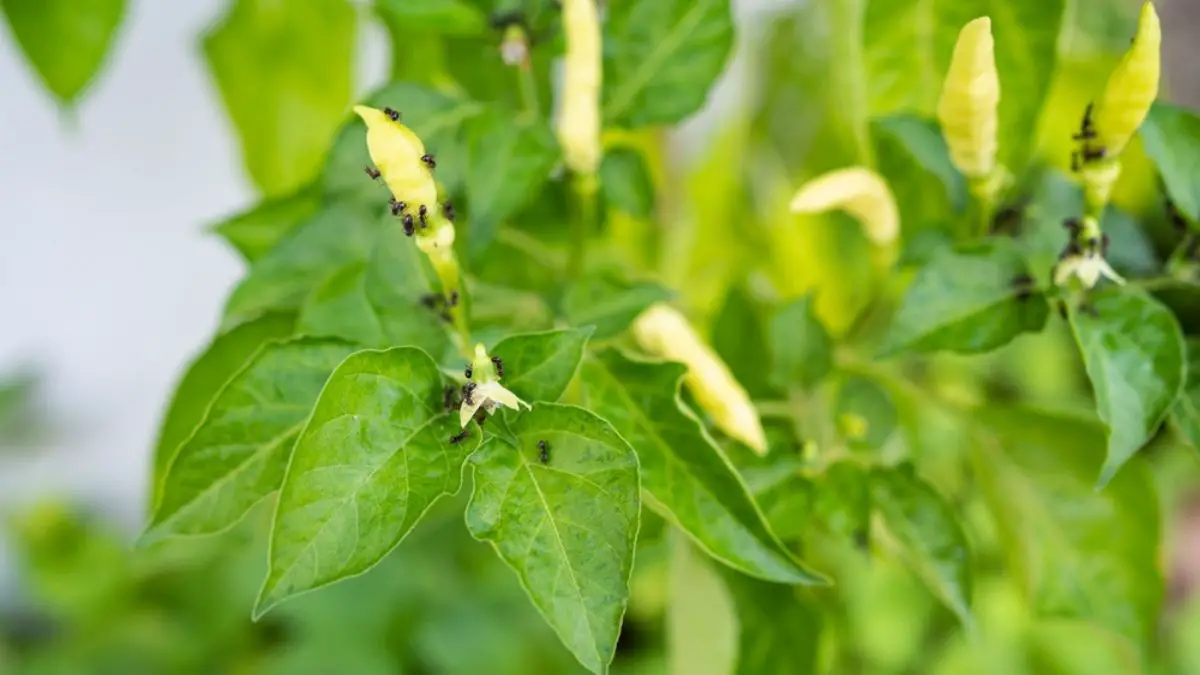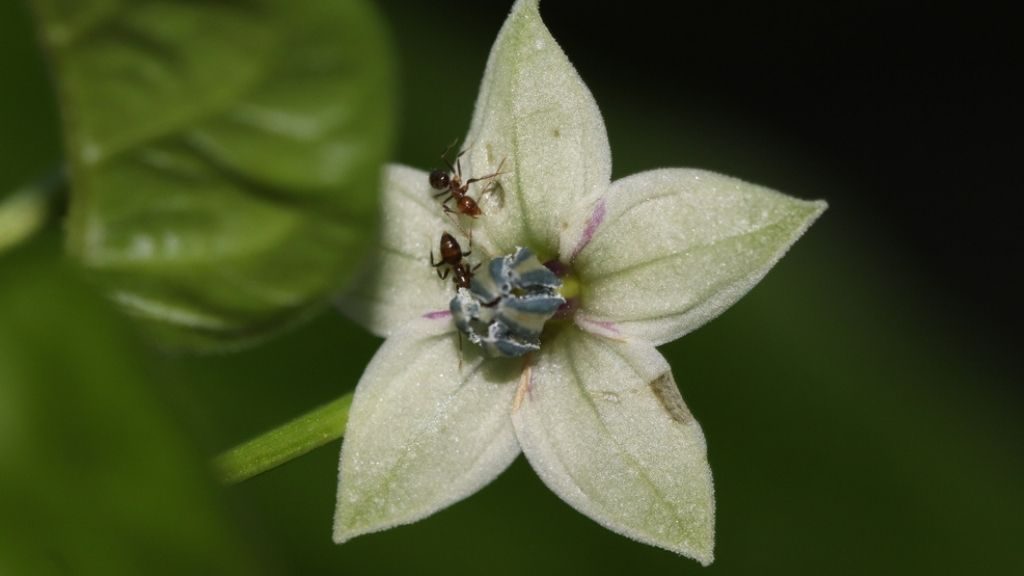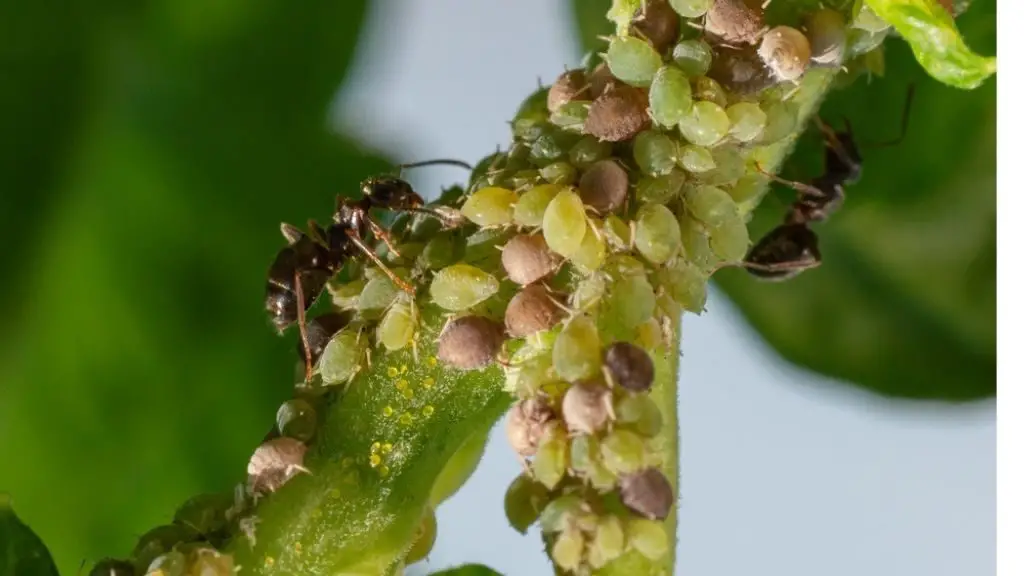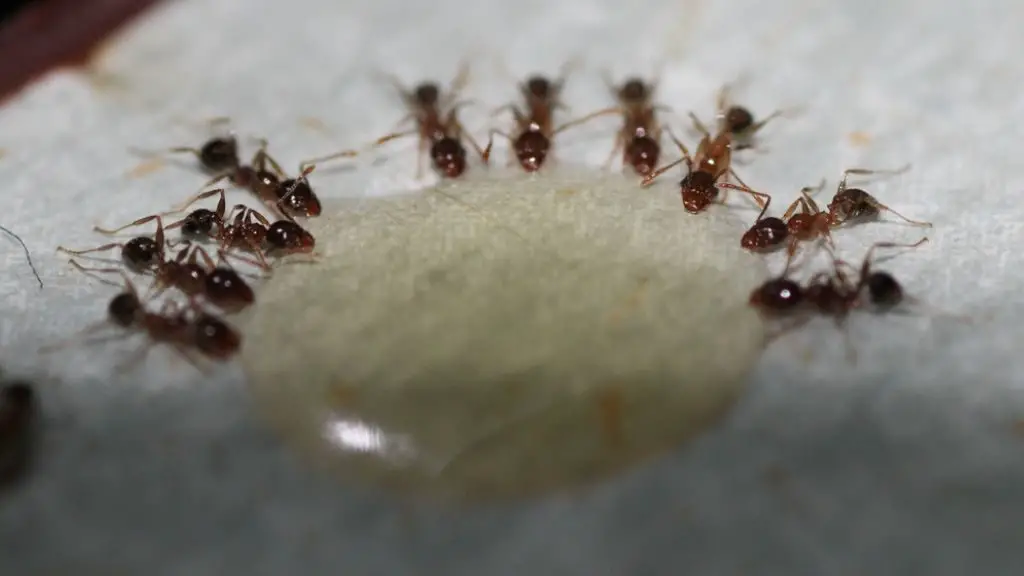Are you witnessing Ants on Pepper Plants? Then be Careful!

Pepper plant cultivation is happening all around the world and we are grateful. No one wants to imagine a world where there are no peppers. Can you imagine how our foods will taste without them? But today, pepper plants still face a lot of problems and ants are one of them. So, how Ants on pepper plants are harmful? We are answering this question which may surprise many of you.
We bet you thought ants are one of the good insects there are in the world. Well, they do have some benefits but there is another side of the coin.
In pepper plants, Ants are a great help when it comes to pollination. Due to them, fruit formation happens. Moreover, they eat a number of insects as well. However, like everyone, ants have a dark side too. They cause damage to plants which we are discussing later in this article.
What makes an Ant Good for Pepper Plants?
Ants are one of the most effective biological control agents available. They eat other insects, including those larger than themselves. These microscopic insects have a thing for their six-legged counterparts, whether they’re in our gardens or farms, or inside our houses and on buildings.
In addition to this, when it comes to pollination, ants are the ideal helpers. Pollination can be a pain, so we frequently use hand pollination methods to ensure a prolific fruiting season. Luckily, ants can spread your pollens without your permission because they do so unintentionally while searching and scavenging for food.

Are Ants Bad for Pepper Plants?
You must be wondering Are ants on pepper plants bad, here is the answer. Although ants have a good mutualistic relationship with our pepper plants, if left unchecked, tiny ants on pepper plants can destroy them. When you find ants wandering over your pepper plants, which are also infested with aphids, you should be concerned.
The Ant-Aphid Connection
If you see both aphids and little black ants on pepper plants, then you have to do something. Why? Because Several ant species have a mutually beneficial symbiotic relationship with aphids, in which the ant’s guard and “herd” the aphids on pepper plants and in return feed on the aphids’ honeydew.
In fact, worker ants are specialized in protecting and caring for aphids that exist in ant species that have this interaction with aphids. They’ll even bring aphids as well as their eggs back to their new colony in the winter.

Do Ants Kill Pepper Plants?
It’s highly improbable that ants will kill a pepper plant on their own. Leafcutter ants on hot pepper plants usually eat a few leaves at a time. If the ants are guarding aphids on the pepper plants, then the situation gets worse, especially for young pepper plants. Death of Pepper plants may also occur due to Aphids.
However, mature pepper plants will not necessarily die unless they have a significant aphid infestation that covers the entire plant. But even if the infestation is low, plants will be weakened and produce low yields. Moreover, Later in the growing season, this infestation will make plants more susceptible to disease, which could kill your pepper plants.
How to Get Rid of Ants on Pepper Plants?
Want to know how to get rid of ants in Garden without killing plants? Don’t worry as this part covers the ways you can get rid of ants without damaging plants.
It’s easier to deal with the aphid and orange ants on pepper plants directly. For those who are thinking about how to protect plants from ants naturally, we have the easiest remedies. These natural remedies will help you get rid of severe aphid infestations and ants crawling on pepper plants.
Let’s have a look at the best ways to get rid of small ants on pepper plants
Use Vinegar to kill Ants in Garden
You should use vinegar to kill ants in Garden. On pepper plants, both apple cider vinegar and white vinegar can deter ants. However, before spraying them on the leaves, you must combine them with equal parts of water.
The vinegar’s intense odor makes it difficult for the ants to follow each other along their trails. At the same time, ants would avoid approaching the plant since the odor would interfere with their communication. This is a temporary remedy, but depending on the ant infestation, it may be effective.
Another approach is to use a solution of water and white vinegar. In a spray bottle, combine 50 percent water and 50 percent white vinegar to make a white vinegar and water solution. Pepper leaves or the surrounding region can be sprayed with the solution.
The odor of white vinegar kills the ants. As a result, spraying the solution around the plants makes it difficult for ants to approach them. Spraying the solution on the leaves will kill the aphids, removing a source of food for ants.
Apply Diatomaceous Earth to Get rid of Red Ants on Pepper Plants
Another effective method for controlling ant populations is to employ non-toxic materials, such as diatomaceous earth. If this is your first time hearing about this wonder powder, don’t be alarmed. It’s quite simple to apply and has no adverse effects on humans or plants.
Diatomaceous Earth, sometimes known as DE, is a white chalk-like powder formed from finely crushed fossilized diatom shells. This low-cost soft sedimentary powder kills red ants on pepper plants as well as beetles, ticks, slugs, and earwigs.
Simply spread DE throughout the locations where ants can pass through. The jagged crystal-like particles operate like razor-sharp glass, piercing ants’ legs, joints, and even their exoskeleton. The penetrating material seeps into the ants’ lungs and other organs, causing breathing and eating problems that finally kill them.
People often ask us how to stop ants nesting in plant pots. Well, DE is the best solution to stop ant nesting. Despite the fact that it is non-toxic to humans, wear a mask when spreading this powder because it can still hurt your lungs if inhaled.
DIY Pesticide mixture to Get Rid of Ants
People ask, how to get rid of ants on pepper plants with a DIY mixture. A DIY mixture is fairly easy to make. You can make DIY pesticides with common household items.
The oil with dishwashing soap is your best DIY option. In one quart of warm or boiling water, add half a tablespoon of dishwashing liquid and half a tablespoon of oil. Spray the ants with the liquid in a bottle with a nozzle. The concoction will absorb into the body of the insects, and suffocate them.
Borax Trap for Ants
People ask us how to get rid of ants in plants and we suggest them Sodium tetraborate or Borax. It is the same ingredient that gives toothpaste and soap their cleaning ability. But did you know it is also possibly one of the most popular killers for aphids and tiny ants?
The borax Ant trap now comes in a variety of forms that you can make at home. It is frequently determined by the materials’ availability and pricing. However, because the chemical is harmful to the insects when consumed, they all provide good results in controlling ant populations.
The main concept behind the trap is to combine the borax powder with an ant-attractive substance. Of course, sugar is one such substance but you can also use honey or any other sweet food that would work well.
Apply Cinnamon Powder or Cayenne
Want to know how to protect plants from ants naturally? If you have any leftover spices, then you can use them to control ant populations in a simple yet efficient way. Ant repellents such as cayenne and cinnamon powder are particularly effective. But keep in mind that they can only be used to repel ants, not to kill them. Ants will be deterred by sprinkling either of these powders around the periphery of your pepper plants in the shape of a band.
Ant Baits
If everything else fails, ant baits are a viable option. Commercially produced ant baits are widely accessible and can be purchased at pest control retailers. Rather than resorting to toxic insecticides, these baits can be used to manage ant populations when they become too annoying. And they’re available in a variety of forms, including liquid, paste, and powder, with a variety of attractants, including sugar, oil, and protein.

Before buying and using ant baits, always consult a pest control specialist to ensure you’re getting the proper one for your ant problem.
Wrapping Up
All in all, ants on peppers plants are not a serious problem, but if you do see ants in conjunction with aphids, then this is alarming. Despite the fact that ants are a typical concern for most pepper producers and farmers, seeing them in your gardens or fields is a welcome sight. After all, you can’t deny their benefits and services to your crops, particularly when it comes to pollination. As a result, we recommend that you just utilize ways to control their population rather than eradicating them entirely.
So, before you utilize any of the procedures suggested above, make sure to verify and analyze the damage first. It is the aphids that are your main enemies and not the ants.
FAQs
How do I keep ants off my pepper plants?
Sprinkling ground cinnamon or cayenne pepper around your plants will help you get rid of little black ants on pepper plants. If you have any leftover spices, you can use them to easily and effectively manage ant populations.
However, keep in mind that they are only effective at repelling ants, not killing them. After using this method, you will proudly say that there are no black ants on my pepper plants.
How do I get rid of ants and aphids on pepper plants?
If you’re wondering how to get rid of ants and aphids on pepper plants, the most efficient way is to use non-toxic products available on the market, such as diatomaceous earth.
DE, or Diatomaceous Earth, is a white chalk-like powder made from finely crushed fossilized diatom shells. It’s easy to use and has no negative consequences for humans or plants. Ants, cockroaches, beetles, ticks, slugs, and earwigs are all killed by this low-cost soft sedimentary powder.
Are ants bad for vegetable plants?
People ask, are ants bad for pepper plants and the answer is a little complicated. Garden ants can be useful in the vegetable garden because they act as pollinators by crawling from bloom to bloom in search of nectar, and they can also remove hazardous caterpillars. Normally, these ants do not harm vegetation by removing leaves from plants.
The only time the ants might become a concern is if the population grows to a point where it becomes an infestation. Also, ants protect aphids which are highly undesirable by growers. That is why if you see aphids and ants on pepper plants, immediately apply some treatments.
Why are there ants on my jalapeno plant?
Aphids suck the juice from the plant stems. Ants subsist on a honey-like liquid that they exude. Ants and aphids have a symbiotic relationship, and you’ll observe ants growing, herding, and cultivating aphids for food. In reality, in ant species that interact with aphids, worker ants specializing in protecting and caring for aphids exist. Ants appear on those jalapeno plants which have aphids on them.
Related Topics:








